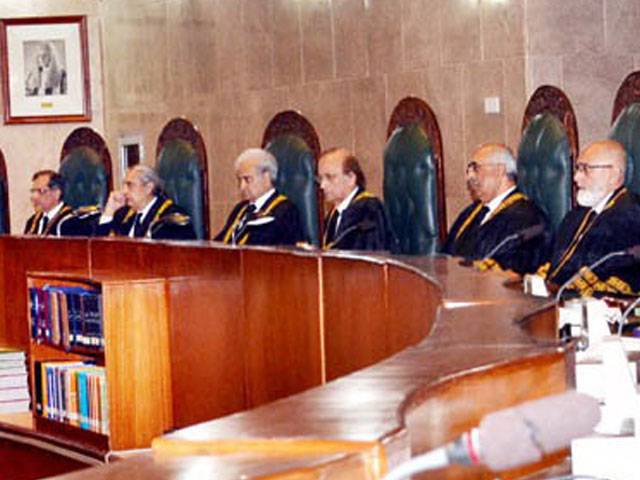ISLAMABAD - Chief Justice Tassaduq Hussain Jillani has urged the government and all other institutions to protect democracy, saying this protective role is also the most sacred duty of all courts, particularly the Supreme Court.
“We have to protect the constitutional values of democracy, religious tolerance, human dignity, and provide inexpensive and expeditious justice,” said the chief justice while addressing the Full Court Reference held here in the Supreme Court on the eve of Justice Khilji Arif Hussain’s retirement.
The chief justice acknowledged that the country is facing many problems including terrorism and sectarianism but he made it clear that the judiciary will not let anyone curtail freedom of the citizens or restrict their movement in the name of national defence. He stressed the need for striking a proper balance between the conflicting values and principles i.e. the value of security of the state and individual rights.
He pointed out that the judiciary in its endeavour to strike the balance between the conflicting values often attracts criticism from both sides. He said that those standing for human rights may contend that the court gives too much protection to security and ignores human rights; those who speak of security concerns may allege that the court is tilted towards human rights rather than security. “These comments should not deter us to uphold the rule of law and the canons of democracy,” the CJP maintained.
He said that the constitution makers in the very preamble pledged that “the independence of the judiciary shall be fully secured”. Though it is the function of each organ to ensure enforcement of the rule of law, it is the judiciary which ultimately has to declare what the law is; through its power of judicial review, he said.
Justice Jillani said that the country faces a multitude of challenges in the form of terrorism, sectarian violence, ethnic cleansing of minorities and weakened rights for women and children. He said it is the duty of Supreme Court as a pillar of the state to hold fast to belief in the seminal values of the rule of law, of human dignity, of tolerance and of compassion.
The chief justice further said that constitution makers wanted to implement social, economic and political justice for which vision has been embedded in the constitution through Fundamental Rights and the principles of policy. It is “to ensure that these goals are pursued by each organ of the state; (and) that no organ acts beyond the role assigned to it under the constitution and the law,“ he added.
Paying rich tribute to Justice Khilji Arif Hussain, the CJP said the performance and contribution of the honourable judge can be seen from his legal opinions, judgments and general demeanour as a judge, adding throughout the course of his career Justice Khilji devoted his prudent insight, legal acumen and insightful mind to the development of the rule of law in the country. His judgments have reiterated the importance of several constitutional principles of the utmost value to the judiciary such as that of the trichotomy of power and independence of judiciary, the CJP said.
Speaking on the occasion, Justice Khilji Arif Hussain said that today Supreme Court is an inevitable institution for the common man; independent in action and free in thought, showing strength, excellence and courage under the most demanding circumstances. He said the apex court has been through the most difficult and turbulent periods in the history of Pakistan, and ultimately acquired the reputation of protector of the constitution, democracy, rule of law and guardian of fundamental rights of the people of Pakistan.
“Let me assure you that aims and objects of every judgment of this court are to enforce the constitution and to protect the fundamental rights of the people of Pakistan.“ Justice Khilji said that whenever he got depressed while looking at the institutions of the country, his colleagues gave him the courage saying that leaves of autumn sprinkle fragrance, giving message of spring ahead.
Justice Khilji expressed thanks and gratitude to Chief Justice Tassaduq Hussain Jillani and his colleague judges, for their inspirational support while he was at the Bench. Supreme Court Bar Association (SCBA) President Kamran Murtaza also addressed the Full Court Reference.
The Supreme Court judges had in the past been under subjugation to comply with orders from other power quarters until the judicial movement which saw the former chief justice Iftikhar Muhammad Chaudhry restored on the strength of public support in the streets. Since then, the SC has assumed an independent posture on many of the national issues. Most prominent and popular matters emerged out of its use of suo mottu powers.
Tuesday, April 16, 2024
No curtailing rights in name of security: CJP
| Says SC ultimate arbiter on a law’s legality | Duty bound to protect democracy, strike balance between conflicting values

Caption: No curtailing rights in name of security: CJP
8:54 PM | April 16, 2024
8:53 PM | April 16, 2024
Death anniversary of comedian Babu Baral being observed today
10:12 PM | April 16, 2024
Heavy rains lash UAE and surrounding nations as the death toll in Oman flooding rises to 18
10:11 PM | April 16, 2024
Israel's military chief says that Israel will respond to Iran's weekend missile attack
10:11 PM | April 16, 2024
PM Shehbaz, Saudi FM confer on regional affairs and strengthen bilateral ties
9:25 PM | April 16, 2024
Pakistan invites Saudi Arabia for joint ventures in PIA, airports
9:04 PM | April 16, 2024
Political Reconciliation
April 16, 2024
Pricing Pressures
April 16, 2024
Western Hypocrisy
April 16, 2024
Policing Reforms
April 15, 2024
Storm Safety
April 15, 2024
Democratic harmony
April 16, 2024
Digital dilemma
April 16, 2024
Classroom crisis
April 16, 2024
Bridging gaps
April 16, 2024
Suicide awareness
April 15, 2024
ePaper - Nawaiwaqt
Advertisement
Nawaiwaqt Group | Copyright © 2024





